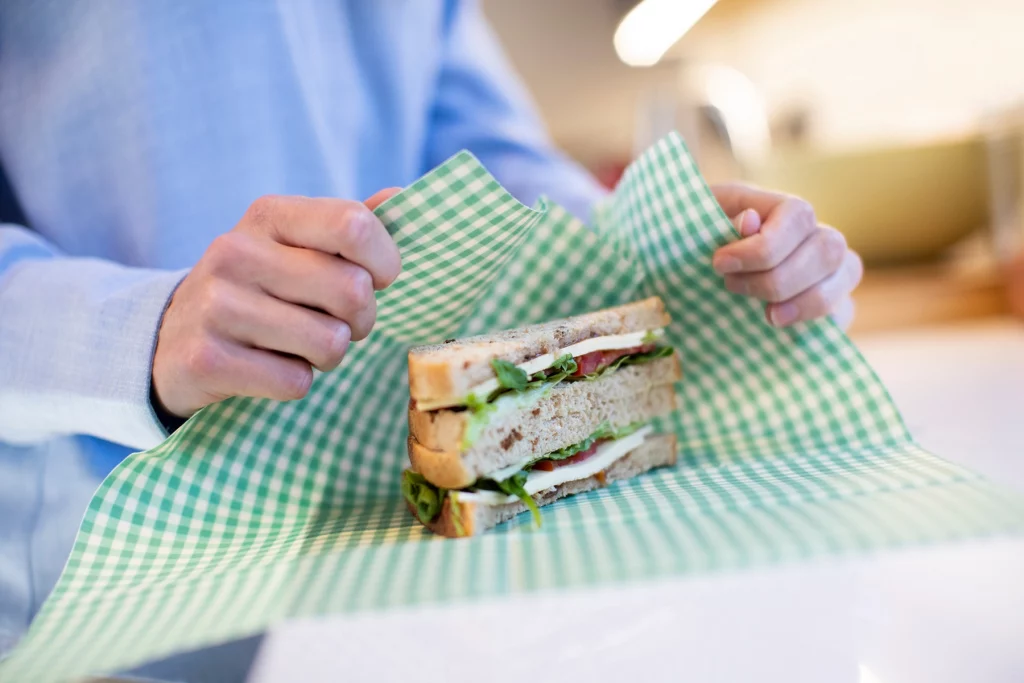Many of us can remember a time when there was no such thing as plastic. Now our lives seem inundated with it, especially in the kitchen, with plastic wraps and a multitude of various-sized containers. Aluminum foil was hailed as a big improvement over tin foil, but now we recognize that it leaches into foods through heat or contact with anything salty or acidic. Maybe it’s time to return to some earlier methods of kitchen storage, and take a more earth-friendly look at new ones.
Replacing plastic wrap and foil:
- Plain cotton or linen kitchen towels or aprons are quick breathable wrapping solutions for foods that need to cool down using air circulation before being refrigerated, to keep the item from getting soggy, or as a temporary cover to take a warm pie or dish to a potluck. Wrap your goods in the apron and use the ties to keep it in place.
- Waxed paper can be used for more permanent refrigerator protection, or for portable sandwich wraps.
- If you want to bake, serve and store your meal in the refrigerator, skip the aluminum foil for a permanent solution in Pyrex tempered glass or Le Creuset ceramic or cast iron baking dishes with lids.
- Beeswax cloth is cotton or linen that is coated with beeswax to wrap tightly around any bowl or dish and seal it in place. They can be reused many times. Wash these only in cold water to keep the wax from melting off. You can even make your own by using one of two heating methods: using an oven and using an iron. This is a clean solution for your food because both linen and beeswax are antibacterial.
- Paper sandwich bags are helpful for storing vegetables because they need to ‘breathe’ to keep from going bad so quickly. Wax-coated sandwich bags will keep non-liquid items fresh in the refrigerator for days.A short-term storage alternative to wrap an item such as a sandwich for a couple of hours is a paper towel or two. It helps the sandwich retain it’s moisture.
Storing liquids:
- Store liquids and leftovers in Mason jars or repurposed jars. Look for a glass jar with a wide mouth that will be easy to fill. Some spaghetti sauce brands have jars with graduated cup measurements molded into the glass. These jars are sturdy, meant to be reused, and are great for storing liquids.
Countertop and cupboard:
- If you cook a lot and have bowls of chopped or mixed ingredients that need to sit out to congeal, mix, marinate, melt or rise (like pizza dough), it might be sensible to buy or sew your own washable cotton fabric bowl covers that have elastic around the edges or can be secured with a big rubber band.
- Another old-time favorite is to reuse cookie tins for general storage. These are usually made of lightweight steel which will not leach, and they are stackable.
- Ceramic crocks are making a comeback as a natural alternative to plastic canisters for flour, sugar, coffee, spices and other dry goods. Just make sure they have a good, airtight lid.
- Japanese bamboo bento boxes make a delightful short-term storage alternative. Often, used as a lunch box, they can be wrapped in cloth to keep food warm or cold.
- Glass containers are making a comeback, this time sporting silicone-lined or bambii lids for eco-friendly air-tight food storage.
Overall Kitchen Use:
Using a mind-boggling method, the silica in quartz is mixed with water and methanol, turned into a metal and then into a polymer to create silicone. It’s been approved for kitchen use since 1979. Silicone is considered vegan-safe because it comes from natural elements. It is oven-safe and freezer-safe. Although not biodegradable because it is sand-based, it is environmentally friendly, and can be used for a lifetime. Choose from silicone storage containers, baking materials, covers and reusable zip-style baggies.
What’s on the horizon? A sprayable polysaccharide mixed with antimicrobials, developed by Rutgers University, according to thetakeout.com. Akin to spun sugar cotton candy at the fair, this packaging would be airtight like shrink wrap, and extend the life of products such as avocados substantially. Maybe we can soon say goodbye to plastic wrap altogether.

